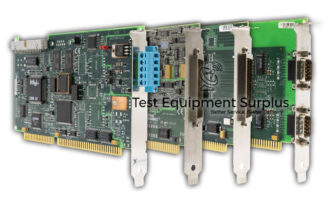Description
The National Instruments HDD-8263 RAID Array, with part number 780065-01, is equipped with a 4-port hardware RAID controller and is designed in a compact 1U Chassis form factor.
This robust storage solution supports up to four SATA hard drives and seamlessly integrates with a PXI system via a PXI extension module (NI 8262).
Connection reliability is ensured through the use of a high-quality x4 cabled PCIe cable, and the system boasts an impressive maximum read/write rate of 150 MB/s.
By default, the HDD-8263 is configured in RAID 0 mode for optimal performance, but it also supports a range of other RAID modes including RAID 1, RAID 5, RAID 10, and JBOD for various application requirements.
The RAID array allows for hot swappable drives in redundant mode, enhancing data security and system uptime, with the manufacturer recommending RAID 0 for most efficient operation.
Designed for flexibility, it supports cable lengths of up to 3 meters, facilitating easy installation and maintenance.
Finally, the HDD-8263 RAID Array maintains a maintenance status that ensures availability for purchase and repairs through Apex Waves, providing long-term serviceability and support.
| Feature | Description |
|---|---|
| Product Name | National Instruments HDD-8263 RAID Array |
| Part Number | 780065-01 |
| RAID Controller Ports | 4-port hardware RAID controller |
| Form Factor | 1U Chassis |
| Hard Drive Support | Up to four SATA hard drives |
| Connection to PXI System | PXI extension module (NI 8262) |
| Cable Type | x4 cabled PCIe cable |
| Max Read/Write Rate | 150 MB/s |
| Default RAID Configuration | RAID 0 |
| Supported RAID Modes | RAID 0, RAID 1, RAID 5, RAID 10, JBOD |
| Hot Swappable Drives | Supported in redundant mode |
| Recommended Operation Mode | RAID 0 |
| Cable Support Length | Up to 3 meters |
| Maintenance Status | Available for purchase and repairs by Apex Waves |
Question 1: What are the different RAID modes supported by the National Instruments HDD-8263 RAID Array apart from the default RAID 0 configuration?
Answer 1: The National Instruments HDD-8263 RAID Array supports RAID 1, RAID 5, RAID 10, and JBOD configurations in addition to the default RAID 0 mode.
Question 2: What is the range of RAID modes supported by the National Instruments HDD-8263 RAID Array, with part number 780065-01, and what is its default configuration?
Answer 2: The National Instruments HDD-8263 RAID Array, with part number 780065-01, supports a range of RAID modes including RAID 0, RAID 1, RAID 5, RAID 10, and JBOD, with its default configuration set to RAID 0 mode for optimal performance.
Question 3: What are the various RAID modes supported by the National Instruments HDD-8263 RAID Array, part number 780065-01, and what is the recommended configuration for optimal performance?
Answer 3: The National Instruments HDD-8263 RAID Array, part number 780065-01, supports RAID 0, RAID 1, RAID 5, RAID 10, and JBOD modes, with RAID 0 being the recommended configuration for optimal performance.
Question 4: What types of RAID configurations does the National Instruments HDD-8263 RAID Array support, and what is its default configuration for optimal performance?
Answer 4: The National Instruments HDD-8263 RAID Array supports a maximum read/write rate of 150 MB/s and accommodates various RAID configurations, including RAID 0, RAID 1, RAID 5, RAID 10, and JBOD, to meet different application requirements.
Question 5: What is the maximum read/write rate supported by the National Instruments HDD-8263 RAID Array, and which RAID configurations does it accommodate for varying application requirements?
Answer 5: The National Instruments HDD-8263 RAID Array supports RAID 0, RAID 1, RAID 5, RAID 10, and JBOD configurations, with RAID 0 being the default configuration for optimal performance.


